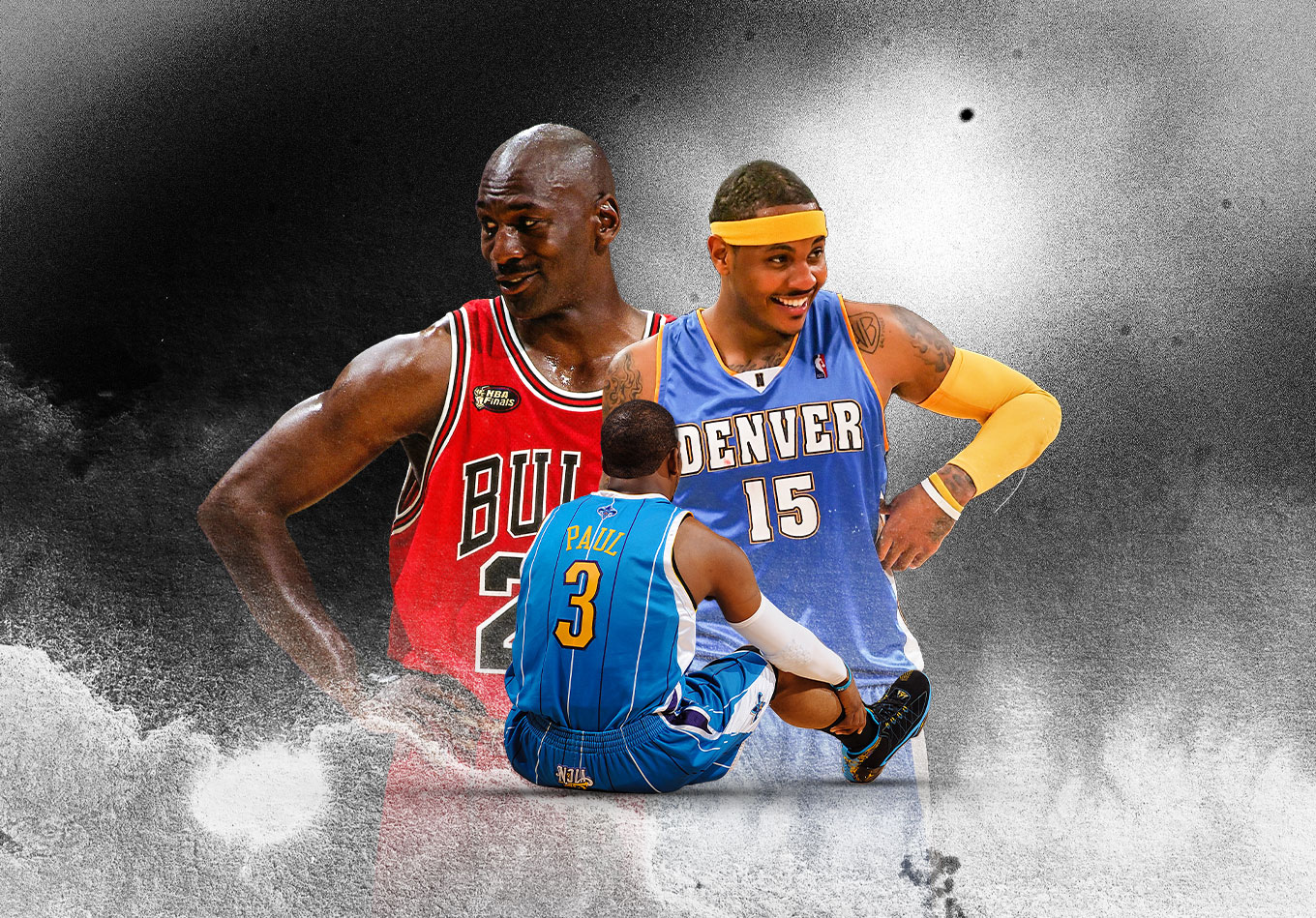Sports
On to the Next One: The Biggest Blowouts in NBA Playoff History – The Analyst

It’s the time when new rivalries are born, and old ones reach new flashpoints.
While the NBA playoffs do bring the best teams together, not every unit is wired equally well. Not every organization rises to the occasion. Slip-ups, although not common, aren’t a rarity either in the postseason.
Such is the ruthlessness of the league, as bad nights during the business end of the season rarely go unpunished. Great teams love to bring the hammer down on their opponents in NBA playoff games when presented with the opportunity and as such, we’ve witnessed some massive playoff blowouts over the years.
Here are the biggest of those.
The then-Hornets hosted Game 4 of their first-round series against the Nuggets looking to avoid falling into a 3-1 deficit on their home court. They had barely done so in the previous game after losing by double-digits in the first two in Denver.
Things didn’t go according to plan as poor shooting and a slew of turnovers from the likes of Chris Paul and David West led to the hosts falling behind by 21 points in the first quarter. The Hornets still had an outside chance down 61-39 at halftime, but that’s when Denver put the clamps on.
Led by Chauncey Billups and Carmelo Anthony, the Nuggets forced the Hornets into bad shots while making them pay on the other end. The hosts went 3 for 12 from the field in the third quarter and were outscored 27-11. The game was already over by then, but JR Smith decided to deliver another knockout punch as he scored 10 points in the fourth and Denver outscored the hapless hosts by 20 in the final period.
The Nuggets ended up with a 58-point margin of victory and would go on to the Western Conference semifinals. Anthony led the way with 26 points, seven assists, six rebounds, two blocks and two steals. Chris Paul, meanwhile, had a night to forget, finishing with just four points on 2-of-7 shooting and committing six turnovers.
The Lakers were perennial winners of the first decade of the NBA (or the NBL as it was originally called). Heading into the 1956 playoffs, they weren’t their dominant selves despite winning three of the previous four titles.
In the Western Division semifinals, they were up against the rising St. Louis Hawks, who were led by the 1956 All-Star Game MVP in Bob Pettit. The Hawks won the first game and would advance with one more victory in the best-of-three series. The Lakers, however, were ready to punch back when the teams met at the Minneapolis Auditorium for Game 2.
Led by future Hall of Famers Slater Martin, George Mikan, Clyde Lovellette and Vern Mikkelsen, the Lakers outscored the Hawks by at least 10 points in each quarter and scored 36 in each of the last three of them. All 10 of their players scored in double digits, while Pettit shot just 4 of 15 from the floor for St. Louis.
Despite the huge victory, the Lakers did go on to lose the series with a one-point loss at home in Game 3. The Hawks wouldn’t go much further either, falling to the Fort Wayne Pistons in five games in the West finals.
Looking to reach their ninth NBA Finals in 12 seasons, the Lakers had to cross one final hurdle in the form of the Golden State Warriors, who had switched their name from the San Francisco Warriors just two years earlier. The Lakers boasted of the logo himself in Jerry West, future Hall of Famer Gail Goodrich and the declining but still serviceable Wilt Chamberlain. Rick Barry and Nate Thurmond led the Warriors.
The Lakers won the first two games of the 1973 Western Conference finals before the series shifted to Oakland. The Lakers didn’t take their foot off the gas pedal on the road, outscoring Golden State 26-12 in the first quarter before pulling away in the second half.
The Lakers conceded only 36 points after the half while scoring that many in the third quarter alone and adding 37 more in the fourth.
Jim McMillan led the Lakers with 28 points on 12-of-21 shooting and every starter scored in double digits. West was the creator in chief with 11 assists to go along with his 16 points. Chamberlain wasn’t anywhere close to his prime, but still stuffed the stat sheet with 25 boards and 12 points.
The Lakers won the series 4-1, but their hopes of back-to-back titles were quashed by the New York Knicks in the Finals.
The most recent 40-point playoff rout came in the 2020 postseason that took place in the bubble in Orlando.
In Game 5 of their first-round Western Conference series against Luka Dončić and the Dallas Mavericks, the Los Angeles Clippers rolled to a 154-111 victory before closing it out with a 14-point win in Game 6.
After beating Magic Johnson and the Lakers, Portland Trail Blazers, Phoenix Suns, Seattle SuperSonics and the Jazz to win their first five titles, the Bulls sought their sixth crown in a rematch with Utah in the 1998 NBA Finals. Michael Jordan’s last-gasp winner in Game 6 was symbolic of the whole series – but there was one outlier.
While every other game was decided by five points or less, Game 3 was entirely different.
The series was even as the teams moved to the United Center in Chicago. Defense was pretty much the order in the first quarter with the Bulls leading 17-14, but the triumvirate of Jordan, Scottie Pippen and Toni Kukoc lifted the Bulls in the second.
Utah, however, couldn’t get anything going, trailing 49-31 at the half and the onus was on Karl Malone and John Stockton to lead a rally. Instead, things only got worse. Stockton didn’t score again and logged just one assist. His inability to orchestrate affairs led to the team’s collapse, as the Jazz scored just 14 in the third quarter and nine in the fourth.
Malone and Stockton combined for 12 turnovers, while no other Jazz player other than the Mailman touched double figures. Jordan, one of the greatest scorers in league history, led the Eastern Conference champions with 24 points and Kukoc had 16.
Not only did the Jazz receive the biggest thrashing ever in a Finals game, their 54 points are still the fewest by any team in a playoff game in the shot-clock era.
After the Celtics beat the Detroit Pistons in the East finals and the Lakers got past the San Antonio Spurs in the West, the stage was set for the proud franchises’ first meeting in the Finals since 1987.
And although the series appeared to be headed toward a classic Game 6 after each of the first five were decided by 10 points or less, that never transpired as the host Celtics outscored the Lakers 34-15 in the second quarter and totaled 73 points in the second half en route to a 131-92 laugher.
The most recent 30-point blowout in an NBA Finals game came in 2016 when LeBron James had 32 points, 11 rebounds and six assists and Kyrie Irving added 30 in the Cleveland Cavaliers’ 120-90 rout of the Warriors in Game 3. That came three days after Draymond Green had 28 points and Stephen Curry scored 18 in Golden State’s 110-77 victory in Game 2.
After bringing superstar Kevin Durant on board in the offseason, the Warriors got their revenge a year later, beating the Cavs in five games.
Sign up and be the first to receive exclusive stats, news, and updates from Opta Analyst.









